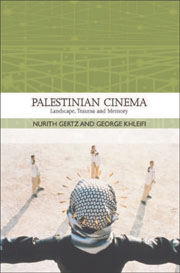Book contents
- Frontmatter
- Contents
- TRADITIONS IN WORLD CINEMA
- Dedication
- Introduction
- 1 A Chronicle of Palestinian Cinema
- 2 From Bleeding Memories to Fertile Memories
- 3 About Place and Time: The Films of Michel Khleifi
- 4 Without Place, Without Time: The Films of Rashid Masharawi
- 5 The House and its Destruction: The Films of Ali Nassar
- 6 A Dead-End: Roadblock Movies
- 7 Between Exile and Homeland: The Films of Elia Suleiman
- Conclusion
- Epilogue
- Bibliography
- Filmography
- Index
6 - A Dead-End: Roadblock Movies
Published online by Cambridge University Press: 05 August 2013
- Frontmatter
- Contents
- TRADITIONS IN WORLD CINEMA
- Dedication
- Introduction
- 1 A Chronicle of Palestinian Cinema
- 2 From Bleeding Memories to Fertile Memories
- 3 About Place and Time: The Films of Michel Khleifi
- 4 Without Place, Without Time: The Films of Rashid Masharawi
- 5 The House and its Destruction: The Films of Ali Nassar
- 6 A Dead-End: Roadblock Movies
- 7 Between Exile and Homeland: The Films of Elia Suleiman
- Conclusion
- Epilogue
- Bibliography
- Filmography
- Index
Summary
Since the last years of the twentieth century and up to the present, directors such as Khleifi, Masharawi, Nassar, and Suleiman, who had established themselves in Palestinian society in general and the Palestinian cinematic landscape in particular, have been joined by a large number of filmmakers, most of whom create documentaries. Some of these filmmakers belong to the generation that grew up and evolved during the period when the Palestinian national movement matured, both within the Occupied Territories and in the Diaspora. Several of them were brought up in the West Bank, in the Gaza Strip, or in the refugee camps, in the years of and between the two Intifadas, when the peace process was crumbling and frustration with the civil struggle for Palestinian Arabs' rights in Israel was growing. Their cinema has evolved without direct contact or relationship with outside cinematic cultures. On the one hand, “the Palestinian national option” during those years became “a central component of identity,” a “source of solidarity across class, geographical and religious borders” (Rabinovitz and Abu Backr, 2002: 53). And on the other hand, these were also the years when Palestinian unity and identity appeared to many to be more threatened than ever.
- Type
- Chapter
- Information
- Palestinian CinemaLandscape, Trauma and Memory, pp. 134 - 170Publisher: Edinburgh University PressPrint publication year: 2008



